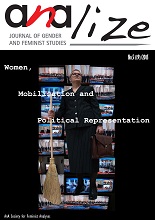Women and Politics: The Impact of the European Integration Process on Women’s Political Representation in Romania
Women and Politics: The Impact of the European Integration Process on Women’s Political Representation in Romania
Author(s): Elena BrodealăSubject(s): Gender Studies, EU-Approach / EU-Accession / EU-Development
Published by: Societatea de Analize Feministe AnA
Keywords: women’s political representation; the Socialist legacy; EU integration; exceeding EU conditionality;
Summary/Abstract: This paper explains what the impact of European integration was on women's political representation in Romania. This impact is particularly interesting for two reasons: firstly, because the European Union does not have competence in the electoral domain and cannot impose Member States any obligation to adopt measures to boost women's representation in politics, and secondly, because women's political representation is generally a "taboo" subject in Romania mainly due to the abusive use of gender quotas by the former Socialist regime. In the case of the first reason, the EU can use only soft law means to raise States' awareness in this field, but Member States are free to decide on measures to increase women's political representation. In the case of the second reason, it has to be mentioned that during State Socialism, the Communist Party imposed quotas in many representative bodies, including the Parliament, this coinciding with the moment when women in Romania received full formal political rights for the first time. Yet, since all women who got in Power were Party members and were not supposed to have a real influence in the decision-making of those times, their presence in politics proved to have had a negative effect on the situation of gender representation after the fall of the regime. After this moment, it was believed that women have a detrimental impact on politics. Thus, the number of women in politics fell dramatically. It is only Romania’s decision to accede to the EU that precipitated a change in the situation. The reason for this, as I argue in this paper, is that a high presence of women in politics started to be seen as a "European value" necessary for Romania's EU accession. This made Romanian decision-makers adopt certain legislative measures and argue in favor of gender quotas, although there was no such legally binding requirement from the EU. Said differently, in order to increase their chances of accession to the EU and foster Romania’s “European identity”, Romanian decision-makers ended up transposing or aiming to transpose EU’s soft law into hard law acts in Romania. To illustrate how and why this happened, the paper will look at two aspects. The first aspect refers to the actual changes brought to this field by Romania’s EU integration, while the second one refers to the political and historical factors that facilitated such changes. These factors include Romania’s undeniable desire to “return to Europe” after the fall of State Socialism, the political pressure put by the EU with regard to increasing women’s representation in politics and the endeavor of local politicians to portray EU accession as requiring measures to ensure gender balance in politics.
Journal: AnALize: Revista de studii feministe
- Issue Year: 2015
- Issue No: 5 (19)
- Page Range: 8-31
- Page Count: 24
- Language: English

